Best Workflow Management Software 2025: 11 Tools Reviewed
Who, what and when? When you know the answers to these questions, you can focus on what really matters: the work itself. But keeping track of everything isn't easy - especially with complex projects and larger teams. That's where workflow management comes in.
Good workflow management creates standardized work processes that benefit the entire team. Workflow management tools help put this into practice. But which ones are the best? We've put together our favorites for you.
What Exactly Is Workflow Management?
A workflow is a sequence of tasks or processes that need to be completed to reach a specific goal. Managing these work processes is called workflow management.
Workflows are everywhere. You can break down every project and process into workflows, which consist of specific work steps. For example, the workflow for creating a blog post might look like this:
- 1.
Topic selection: The team suggests topics for upcoming blog posts in a meeting.
- 2.
Writer assignment: A team member is assigned to a chosen topic.
- 3.
Draft creation: The assigned team member researches and writes a draft of the blog post.
- 4.
Review and editing: The draft is sent to another team member for review.
- 5.
Finalization: The original writer makes the suggested changes.
- 6.
Publishing approval: The finished blog post is submitted to team leadership for final review and approval.
- 7.
Publication: After approval, the blog post is published on the website.
Workflow management helps bring structure and order to these standard processes. By clearly defining which steps need to be done, in what order, and by whom, you can make sure all necessary tasks are completed smoothly and without unnecessary delays.
This not only boosts everyone's productivity but also reduces uncertainty and workload. After all, who wants to waste time wondering what to do next? Clear responsibilities and expectations reduce stress and make work more enjoyable.
What Should Workflow Management Software Do?
Workflow management software makes it easier to handle workflows in everyday work life. These are dedicated programs specifically designed to automate and improve the planning, execution, and monitoring of work processes.
They provide project managers and team members with a central platform where they can design, customize, run, and monitor work processes. Their key features include:
Task Management and Assignment
A basic feature is the ability to assign tasks to team members and set deadlines and priorities. This helps ensure projects are completed on time.Workflow Automation
By automating routine tasks and processes, you can cut down on manual work and boost productivity.Workflow Visualization
Different views like Kanban boards, timelines, and Gantt charts make it easy to see workflows and progress while highlighting various aspects of projects and tasks.Notifications and Reminders
Team members get automatic notifications and reminders about due tasks, updates, or changes in workflows.Subtasks and Dependencies
Workflows consist of specific tasks. These tasks often break down into smaller steps. Tasks may need to be done in a certain order or depend on each other. Workflow management tools should be able to show all of these relationships.
Beyond these basic features, each program offers various additional features. But which one is the best?
The 11 Best Workflow Management Tools
In our comparison of the best project management software, we thoroughly tested eleven providers. Here are the ones that work best for managing workflows:
monday.com: A Bird's Eye View of Workflows

In our project management comparison, monday.com took the gold medal for offering the best mix of ease of use, flexibility, and features. The project management platform promises to help companies of all sizes and industries organize their projects, tasks, and workflows better.
What We Like About monday.com
monday.com stands out with its user-friendly interface that works well for team members of all skill levels. It serves as a central hub for self-managed tasks and gives everyone involved in the project a well-organized, data-driven view of workflows and business processes.
The feature set is solid and includes all important project and workflow management tools: In the customizable monday.com boards, you can manage your workflows with a wide range of views, custom field types, and advanced task management features.
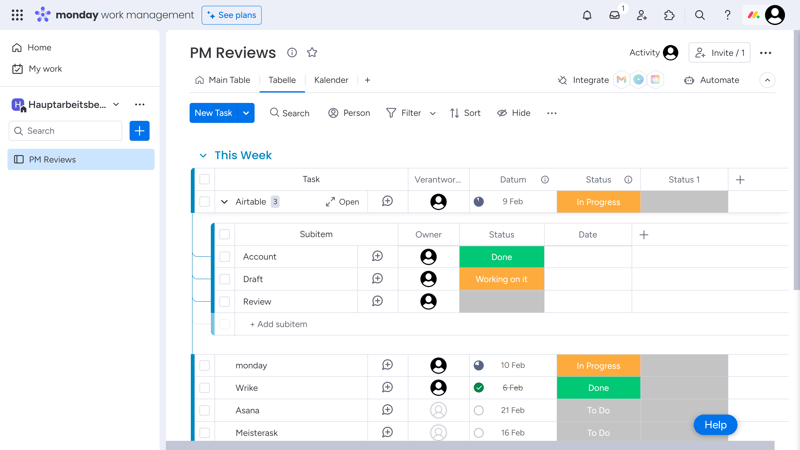
monday.com is the EXPERTE.com review winner.
What Makes monday.com a Good Workflow Management Tool?
monday.com comes with all the basic tools you need for successful workflow management. The platform's biggest strength is providing a high-level overview of projects and processes.
Customizable workflows with many views
You can design your workflows flexibly and visualize them with all important views (like Kanban, Gantt, table, calendar, or timeline). Tasks are also highly configurable thanks to the wide selection of custom field types.Easy to use
monday.com stands out with its modern, user-friendly interface and logical project structure. This helps new team members get up to speed quickly.Over 200 apps available
A large selection of apps and integrations ensures that you can seamlessly fit monday.com into your existing systems and work environments.Extensive automation options
monday.com offers a powerful automation platform. You can either create automations from scratch or use templates.
What Are the Potential Drawbacks of monday.com?
Of course, even our review winner isn't perfect. Other platforms are better equipped, especially for lower-level task management.
Less process focus at task level
monday.com is more data-driven and less process-based than other tools. The display of tasks in workflow context is less intuitive than in programs like Asana, especially for regular users.Limited communication options
Looking for a workflow management tool that also works as a communication platform? Then you're better off with other providers, as monday.com's collaboration features are limited.Key features locked behind pricing tiers
Many important features and views are only available in higher-priced plans, which drives up the costs.
ClickUp: Flexible Workflow Design With Many Configuration Options

ClickUp* is an all-in-one productivity platform that focuses on flexibility and customization. This self-proclaimed "one app to replace them all" aims to provide features that organizations previously needed multiple tools for, helping to reduce fragmented work processes and software costs.
What We Like About ClickUp
ClickUp is incredibly adaptable. You can customize almost every feature, button, and setting to match your specific project needs. This lets you set up, view, track, and analyze your workflows exactly how you want.
While the interface has many settings that make it somewhat complex, it stays organized thanks to its logical hierarchy and project structure through team spaces and project folders.
Plus, ClickUp is much more than just a workflow management tool. It combines project management, document handling, and team collaboration features in one affordable productivity platform that covers (almost) everything.
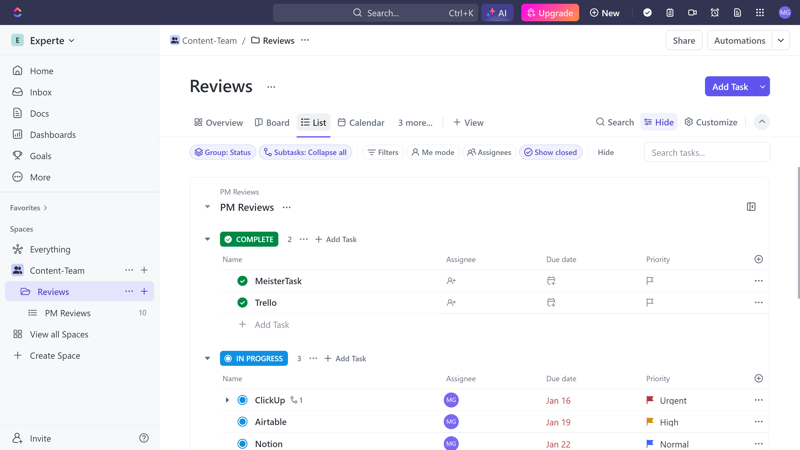
ClickUp is complex but highly adaptable.
What Makes ClickUp a Good Workflow Management Tool
ClickUp's ability to adapt, both at task and project levels, makes it a powerful workflow management platform:
Various visualization tools
ClickUp offers a wide range of visualization tools and display options. Beyond its 15 customizable standard views, it includes special tools like the workload view that shows key insights into project progress and important metrics.Detailed task management
You can create and manage tasks in many ways, including subtasks and dependencies. This flexibility allows for detailed project planning and helps teams organize their workflows precisely.Many workflow templates
You don't need to create workflows from scratch - you can use many templates, including ones for agile workflows, flow charts, or mind maps.Built-in collaboration features
ClickUp makes digital teamwork easier with dedicated collaboration tools. For example, you can work together on workflows or roadmaps using whiteboards.
What Are the Potential Drawbacks of ClickUp?
Compared to more focused platforms, ClickUp's all-in-one approach comes with some drawbacks:
Complex and overwhelming
ClickUp has so many features and customization options that new users might feel overwhelmed. The initial setup is also more complicated than other tools.Not all features are polished
ClickUp tries to do so many things at once that some features feel like add-ons and can't compete with dedicated platforms.Interface could be faster
The ClickUp interface feels sluggish, made worse by frequent stutters and freezes.
Asana: User-Friendly Workflow and Task Management Platform

Asana* aims to cut down on "work about work." Created by former Facebook employees, this platform helps teams keep track of all their tasks, goals, and milestones.
What Do We Like About Asana?
Asana stands out with its quick, easy-to-use interface. It makes project and task management feel dynamic, improving the daily work life of project managers and team members alike. Asana not only makes it easier to plan projects and workflows but also helps team members organize their daily tasks when using it as their main hub.
Asana also offers a solid set of features, including essential views and task functions, plus a very user-friendly automation platform. The wide range of integrations and apps makes the package complete.
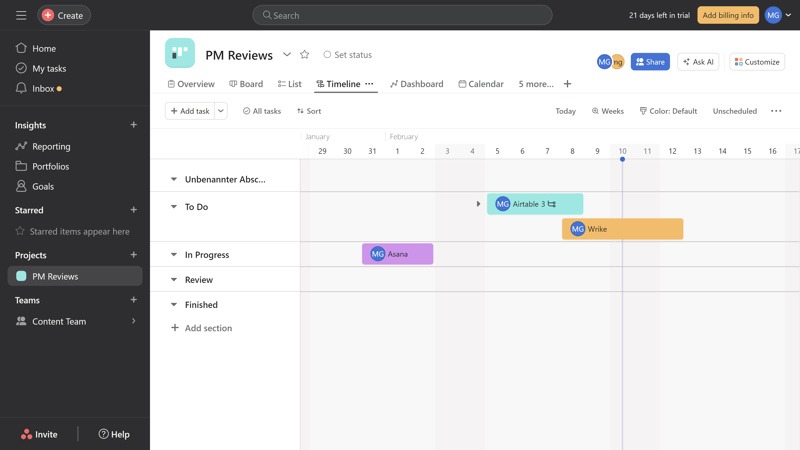
Asana's interface is one of the best on the market.
What Makes Asana a Good Workflow Management Tool?
Asana really shines when it comes to managing task details within broader workflows, making it a powerful workflow management tool.
Process-focused
Asana is a process-oriented tool that puts tasks and workflows front and center. It's a great choice if you need a platform to organize and clearly display work processes from start to finish.Easy automation setup
Asana offers a very user-friendly automation dashboard that shows rules and recurring workflows in a visual way.Fast, beginner-friendly interface
Asana's interface is one of the best available: it's fast, dynamic, and intuitive even for beginners.Great free plan
Asana offers a generous free plan for up to ten people with no limits on tasks or projects.
What Are the Potential Drawbacks of Asana?
Because of its strong focus on tasks and processes, Asana works better for daily task management than for big-picture project planning. Other drawbacks include:
Limited custom fields
You can't customize your tasks as much as with ClickUp or monday.com because there aren't many custom field types to choose from.Basic collaboration features
Like monday.com, Asana is mainly designed for async teamwork. You can't use real-time communication like chat or advanced collaboration tools.
Teamwork.com: Workflow Management for Client Projects

Teamwork* is a project management platform for organizations working on client projects – making it especially suitable for agencies and creative teams. Besides classic project and workload management features, Teamwork.com offers many additional features that make client work easier.
What Do We Like About Teamwork.com?
Teamwork.com handles all regular project management features well: You can visualize your projects with different views, plan tasks in various ways, and customize records with custom fields.
It also comes with extensive collaboration tools that make digital teamwork easier. Beyond communication through private messages and group chats, you can work together on documents in real-time. Plus, built-in budget and billing features help you manage client projects better.
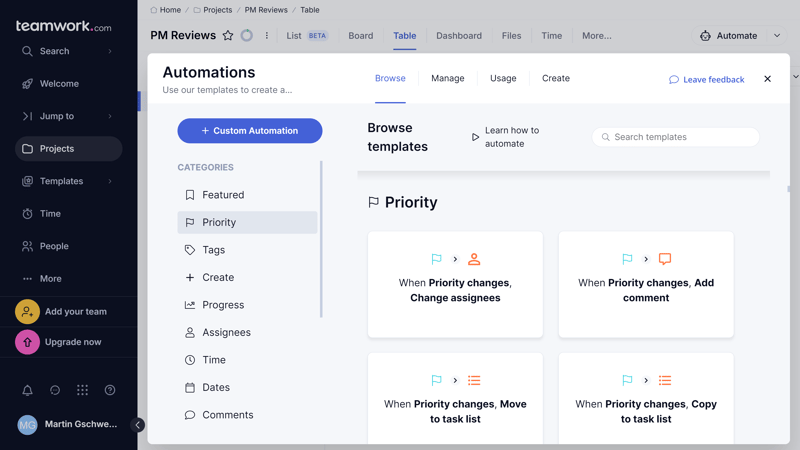
Teamwork.com is particularly good for managing client projects.
What Makes Teamwork.com a Good Workflow Management Tool?
The focus on client work makes Teamwork.com particularly useful for team-based workflows and those that involve clients.
Useful features for client projects
Teamwork.com stands out with built-in budget tracking, time tracking, billing, and other features that simplify recurring workflows in client projects.Client collaboration
Teamwork.com supports working with clients. You can invite unlimited external collaborators to your projects and work with them.Many project views
Tables, lists, Kanban, Gantt, and more: Teamwork.com supports all important views to display your projects.Solid automation options
You can set up automatic workflows using triggers, conditions, and actions. Of course, there's also a selection of pre-made automations that you just need to customize.
What Are the Potential Drawbacks of Teamwork.com?
Of course, compared to other solutions, Teamwork.com has some weaknesses and drawbacks:
Limited Custom Field Types
While you can customize tasks within projects in many ways, the selection of custom fields is somewhat limited.Real-time Collaboration Requires Paid Upgrades
Advanced team features like chat and document management require paid upgrades.Poor German Localization
The Teamwork.com interface isn't fully translated to German, and many translations are incorrect or inconsistent.
Trello: Best Kanban Workflow Tool for Beginners

Looking for a simple solution? Trello* might be worth checking out. This straightforward Kanban tool isn't as flexible or customizable as the other project management tools in our top 5, but it's much easier to use.
What We Like About Trello
Unlike ClickUp, Trello doesn't try to offer every productivity feature under the sun. Instead, it skips the fancy extras and focuses on what it does best: displaying projects in Kanban view.
If you need a user-friendly Kanban solution for everyday projects to visualize and manage tasks as part of straightforward, repeating workflows, Trello has pretty much everything you need.
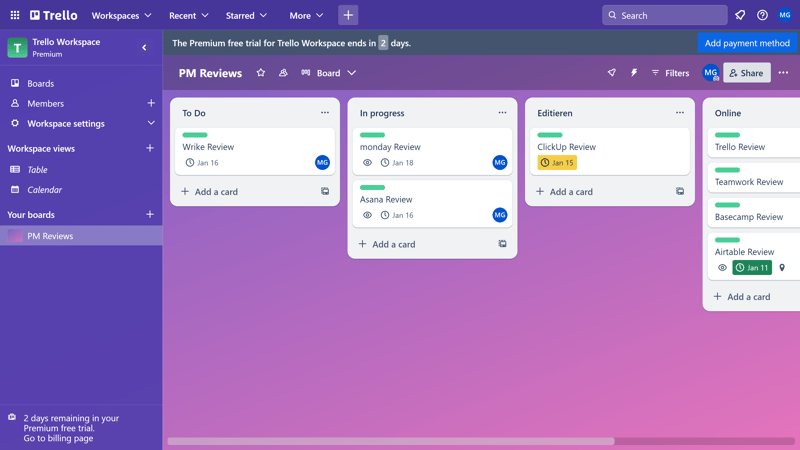
Trello focuses on the Kanban method.
What Makes Trello a Good Workflow Management Tool?
While Trello isn't as powerful as other solutions, it turns these limitations into advantages:
Super easy to use
With its focused set of features, Trello is much simpler to use than other project management tools. Even beginners can get started quickly.Kanban boards at its core
Trello makes it really easy to create custom Kanban boards for your projects. You can set up different lists that show the various stages of your workflows.Lots of templates
Trello offers many templates for specific workflows (like client work, change management, content creation, and more).
What Are The Potential Drawbacks of Trello?
Trello's limited feature set comes with some downsides:
Missing basic features
Several features that come standard with other platforms (like time tracking or reporting) are either missing in Trello or need third-party add-ons.Not for complex projects
Trello's task management features are basic. Without task dependencies and traditional subtasks, you can't map out complex project workflows.No real-time communication
Trello only works for async teamwork. It doesn't have any real-time collaboration tools (like chat or whiteboards).
Other Providers
Our top 5 is just a small selection. You can find our complete ranking of the best project management tools with workflow features here:
Conclusion
As their name suggests, workflows should flow like a river - steady and uninterrupted. This works best when they run smoothly and automatically, letting you focus only on the results or next steps. Good project and workflow management tools make this possible.
The best tool for you depends on your needs. Our comparison of the best project management tools can help you find the right workflow management platform for your needs and budget.
Frequently Asked Questions
Workflow management is the process of planning, running, and monitoring work processes. It includes defining workflows, assigning tasks, setting deadlines, and tracking progress to make sure work gets done smoothly.
Workflow management helps streamline work processes, boost productivity, and improve team collaboration. It helps teams meet deadlines, improve work quality, and spot problems and bottlenecks. This lets teams use their resources better and reach their goals faster.
The best workflow management software depends on what you need. EXPERTE.com's top pick monday.com is a user-friendly all-rounder that gives you a great high-level view of projects and processes. ClickUp stands out with its extensive customization options, while Asana excels at detailed task management and process visualization. Each platform has its pros and cons.
























